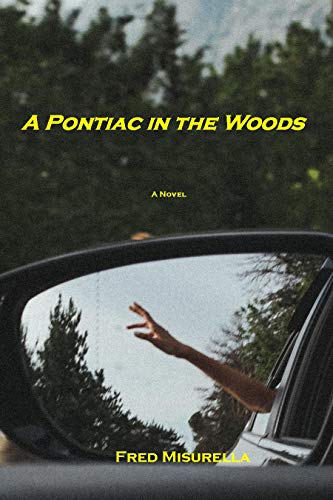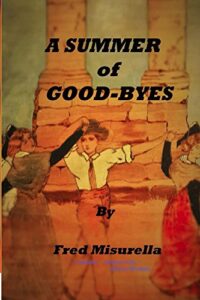
A Pontiac in the Woods received a 4+ star review, making it an IndieReader Approved title.
Following find an interview with author Fred Misurella.
What is the name of the book and when was it published?
The name of the book is A Pontiac in the Woods. It’s a novel.
What’s the book’s first line?
Actually, I have two. The first is in a Note from the Author: “No one has been more important to A Pontiac in the Woods than Jamie Sasso (not her real name), who has whispered her story in my ear during intense private conversations for several years.” The second, considerably shorter and to the point, opens the first chapter, where Jamie’s narrative begins: “’Tough,’” I say.”
What’s the book about? Give us the “pitch”.
This novel is a young woman’s rude, sometimes primitive narrative that packs a surprising punch.
Jamie Sasso suddenly finds herself alone. With no family or home, cast adrift by a distant cousin in another state, she finds she cannot tolerate her county’s foster program. But where can she live, how can she feed herself, and in what way can she plan her future? Will she even have a future?
A Pontiac in the Woods explores those issues and raises sociological, as well as existential, questions about them. With the help of a social worker, Mr. Santa, Misha, a young boy she meets at a dance, and her school’s track coach who takes her under his wing because she runs well, she begins to find her way. But that way is never smooth. More important, she cannot find for certain where that way will lead.
What inspired you to write the book? A particular person? An event?
Jamie appears in the last page or two of my previous novel, A Summer of Good-Byes, which is about Misha’s parents, Ben and Lee Alto, and him as they spend a summer in Provence, where Ben Alto meets an old lover of his. At the end of the novel, they come home and travel to the George Washington Bridge and begin to walk across the bridge to look at the Hudson River and the new World Trade Center. Jamie, who is Misha’s girlfriend, accompanies them and takes their family picture as they cross. She has no lines of dialogue, but for some reason her character haunted me in the aftermath of completing A Summer of Good-Byes, and when I started looking for a new project her character kept coming to me and gradually, as I started writing notes, her voice took over mine and the story became her autobiographical narrative .
What’s the main reason someone should really read this book?
I like to think Jamie’s voice and experiences are interesting in themselves, but I also think her embrace of isolation and aloneness over foster care in the face of all her privations offers an alternative view of a young woman’s emotional strength. I also think the relationships she builds with Misha Alto and her social worker, Dominic Santa, demonstrate the absolute value of human kindness.
What’s the most distinctive thing about the main character? Who-real or fictional-would you say the character reminds you of?
As I said in my previous answer, I think her embrace of isolation and insistence on her own individuality are very distinctive. IndieReader’s reviewer referred to Charles Portis’s female narrator in True Grit. I think that’s right on.
What’s the best and the hardest part of being an indie?
To be honest, the hardest part, hands down, of being an indie author is getting people to read your work. Leading journals and newspapers turn up their noses and refuse to review indie books; most libraries and bookstores won’t stock them; and very few readers pick up indie books to read unless they belong to a generic category like mystery, romance, or science fiction. Literary fiction goes nowhere.
What’s a great piece of advice that you can share with fellow indie authors?
Write because you love to and feel your life is empty without it.
Would you go traditional if a publisher came calling? If so, why?
It would depend on the publisher and the contract. In case you’re wondering, I have turned down traditional publishers, mainly because I enjoy writing, designing, and publicizing the work in my own style. So, I would go traditional if I felt the publisher turned out good looking and good feeling books and could get it read by good readers in the general public.
Is there something in particular that motivates you (fame? fortune?)
See my previous two answers. I write because I love it, and I design the books because it allows me to participate in the tactile and visual experience that books can provide.
Which writer, living or dead, do you most admire?
Among the all-timers, Tolstoy and Melville. Among more contemporary writers, Kent Haruf, a great friend and writer until his way-too-early death from cancer.
Which book do you wish you could have written?
Plainsong and Our Souls at Night, both by Kent Haruf.

